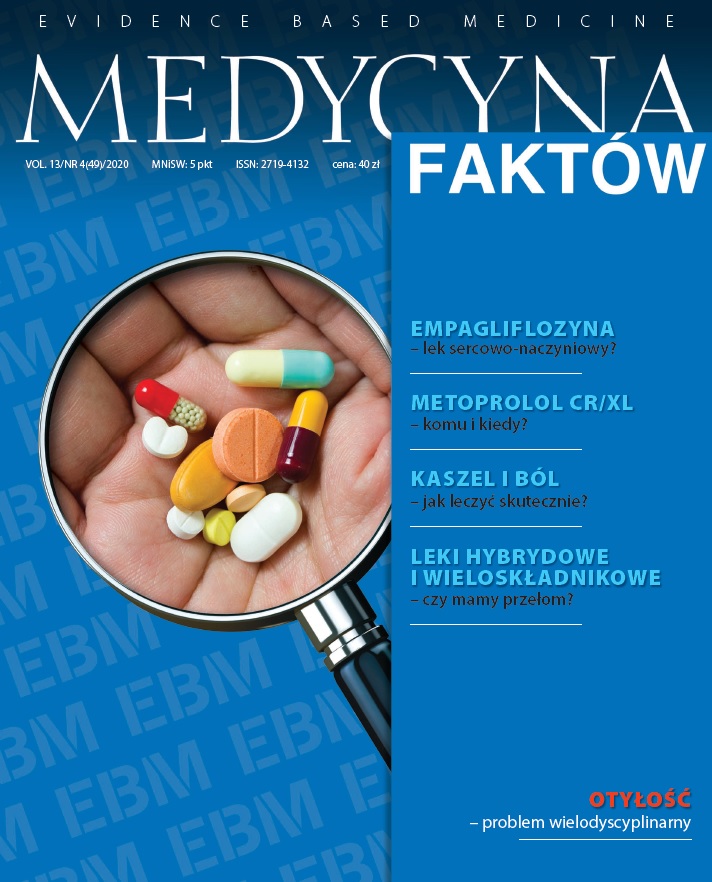Pain – how to treat it effectively and safely during the COVID-19 age? Review article
Main Article Content
Abstract
The health effects of the COVID-19 epidemic concern not only the respiratory system, but also impairs the general condition of the human. The government restrictions result in a reduced amount of physical effort, this may lead to the development and exacerbation of pain in the musculoskeletal system. Due to the limited access to doctors, many patients may try to modify pharmacotherapy on their own, which is why the safety of prescribed painkillers is now even more important.
Article Details
How to Cite
Rupiński , R. (2020). Pain – how to treat it effectively and safely during the COVID-19 age?. Medycyna Faktow (J EBM), 13(4(49), 449-452. https://doi.org/10.24292/01.MF.0420.10
Issue
Section
Articles
Copyright © by Medical Education. All rights reserved.
References
1. Kolasinski SL, Neogi T, Hochberg MC et al. 2019 American College of Rheumatology/Arthritis Foundation guideline for the management of osteoarthritis of the hand, hip, and knee. Arthritis Care Res. 2020; 72(2): 149-62.
2. Lindhardsen J, Gislason GH, Jacobsen S. et al. Non-steroidal anti-inflammatory drugs and risk of cardiovascular disease in patients with rheumatoid arthritis: a nationwide cohort study. Ann Rheum Dis. 2014; 73: 1515-21.
3. Samborski W, Sikorska D, Niklas A et al. NLPZ a powikłania sercowo-naczyniowe i gastroenterologiczne – algorytm wyboru. Forum Reumatol. 2018; 4(3): 143-51.
4. Coxib and traditional NSAIDs Trialists Collaboration. Vascular and upper gastrointestinal effects of non-steroidal anti-inflammatory drugs: meta- analyses of individual participant data from randomised trials. Lancet. 2013; 382: 769-79.
5. van Soest EM, Valkhoff VE, Mazzaglia G et al. Suboptimal gastroprotective coverage of NSAID use and the risk of upper gastrointestinal bleeding and ulcers: an observational study using three European databases. Aliment Pharmacol Ther. 2007; 26(2): 265-75.
2. Lindhardsen J, Gislason GH, Jacobsen S. et al. Non-steroidal anti-inflammatory drugs and risk of cardiovascular disease in patients with rheumatoid arthritis: a nationwide cohort study. Ann Rheum Dis. 2014; 73: 1515-21.
3. Samborski W, Sikorska D, Niklas A et al. NLPZ a powikłania sercowo-naczyniowe i gastroenterologiczne – algorytm wyboru. Forum Reumatol. 2018; 4(3): 143-51.
4. Coxib and traditional NSAIDs Trialists Collaboration. Vascular and upper gastrointestinal effects of non-steroidal anti-inflammatory drugs: meta- analyses of individual participant data from randomised trials. Lancet. 2013; 382: 769-79.
5. van Soest EM, Valkhoff VE, Mazzaglia G et al. Suboptimal gastroprotective coverage of NSAID use and the risk of upper gastrointestinal bleeding and ulcers: an observational study using three European databases. Aliment Pharmacol Ther. 2007; 26(2): 265-75.

